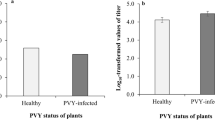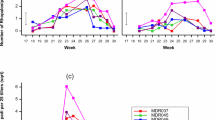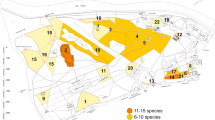Abstract
IT is now well established that migrating aphids alight in, and feed on, crops which they are unable to colonize1, and Broadbent2 has pointed out that such aphids may be responsible for the spread of virus diseases within those crops. An aphid which appears to fill this role in the case of two potato stylet-borne viruses, potato virus Y (PVY) and potato virus A (PVA), in certain districts of Northern Ireland, is Brachycaudus helichrysi (Kltb), the leaf-curling plum aphid.
This is a preview of subscription content, access via your institution
Access options
Subscribe to this journal
Receive 51 print issues and online access
$199.00 per year
only $3.90 per issue
Buy this article
- Purchase on Springer Link
- Instant access to full article PDF
Prices may be subject to local taxes which are calculated during checkout
Similar content being viewed by others
References
Kennedy, J. S., Nature, 165, 1024 (1950).
Broadbent, L., Ann. App. Biol., 35, 379 (1948).
Res. Exp. Rec. Min. Agric. N.I., 4, 98 (1956); 5, 130 (1957).
Calvert, E. L., Plant Path., 9, 144 (1960).
Broadbent, L., Biol. Rev., 28, 350 (1953).
Edwards, A. R., Res. Exp. Rec. Min. Agric. N.I. (in the press).
Author information
Authors and Affiliations
Rights and permissions
About this article
Cite this article
EDWARDS, A. A Non-colonizing Aphid Vector of Potato Virus Diseases. Nature 200, 1233–1234 (1963). https://doi.org/10.1038/2001233b0
Issue Date:
DOI: https://doi.org/10.1038/2001233b0
This article is cited by
-
Comparison of Straw Mulch, Insecticides, Mineral Oil, and Birch Extract for Control of Transmission of Potato virus Y in Seed Potato Crops
Potato Research (2014)
-
10.1007/BF00353449
CrossRef Listing of Deleted DOIs (2011)
-
Progress in aphid forecasting systems
Netherlands Journal of Plant Pathology (1992)
-
Relative efficiency of a number of aphid species in the transmission of potato virus YN in the Netherlands
Netherlands Journal of Plant Pathology (1990)
-
Importance and control of potato virus YN (PVYN) in seed potato production
Potato Research (1988)
Comments
By submitting a comment you agree to abide by our Terms and Community Guidelines. If you find something abusive or that does not comply with our terms or guidelines please flag it as inappropriate.



